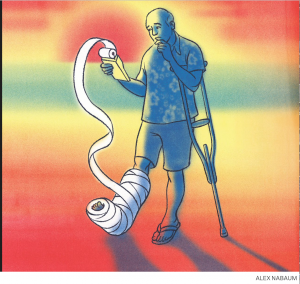In Part I of this series, we discussed options for healthcare insurance coverage for those who choose to retire before age 65 when people qualify for Medicare coverage. We discussed the first two of four options mentioned in an article by Gail Marks Jarvis published in The Wall Street Journal.
The first two options were Employer coverage and ACA (ObamaCare) coverage. Today we’ll discuss two more options; Private coverage and Last Resort options.
Private Coverage
Early retirees who don’t qualify for a subsidy can still buy private insurance through the ACA marketplace, and it is smart to do so even though it will cost full price and is likely more expensive than non-ACA private insurance, says St. Petersburg, Fla., insurance agent Peter Motzenbecker.
That is because there are few private plans available anymore outside the ACA system, and those that remain often don’t have the pre-existing condition coverage provisions that ACA plans do. In other words: ACA plans don’t screen people for their health before insuring them. And whenever people are insured through the ACA marketplace, they will be covered even if an illness stems from a past condition. Private plans frequently deny coverage if they determine a person’s malady stemmed from a condition that existed before they bought insurance.
The denial-of-care risk also applies to private plans that last for only a few months, says Christine Simone, chief executive of Caribou, a firm that helps financial planners compare health plans. Such plans are called “short-term” or “skinny” policies, and people sometimes buy them when they lose a job and need insurance for just a few months before taking a new job or going on Medicare.
Short-term plans are far less expensive than Cobra coverage as a stopgap for someone who leaves the workforce unexpectedly, Simone says, but she calls them “a gamble.” Although you have to pass a health screening to qualify for a short-term plan, a provider could refuse coverage for a condition by deeming it pre-existing.
Depending on the short-term plan, there can also be caps on coverage, such as $1,000 for a hospital stay. That can leave an individual short of what will be needed if, for example, he or she has a heart attack and has to be hospitalized at a cost that can easily be in the tens of thousands of dollars.
“It’s a misconception that private insurance outside the [ACA] exchange is better,” says Chumbley Hogue, the Dallas health-insurance agent.
Last Resorts
Another route to reduce coverage costs for those who have lost their job for health reasons could be through a Social Security disability designation. Such a designation would allow a person to get Medicare coverage before age 65, but Chumbley Hogue warns that the process can take months and Medicare often doesn’t start until 24 months after a person is deemed disabled.
One other alternative advisers suggest is to find work at a business that provides health insurance to part-time workers. Such companies include Starbucks and Trader Joe’s, according to career website Indeed.com. Given employers’ typical contributions to health insurance, an individual working part time for a large company might have to pay about $119 a month for health insurance, according to Kaiser Family Foundation Vice President Cynthia Cox.
All of this information should make you think twice before retiring before age 65. Your health is critical to the enjoyment of your retirement, so don’t take it for granted. Make sure you know in advance where you’re going to get your healthcare insurance and what it will cost. That’s a crucial part of your retirement plan.
All of this information should make you think twice before retiring before age 65. Your health is critical to the enjoyment of your retirement, so don’t take it for granted. Make sure you know in advance where you’re going to get your healthcare insurance and what it will cost. That’s a crucial part of your retirement plan.


